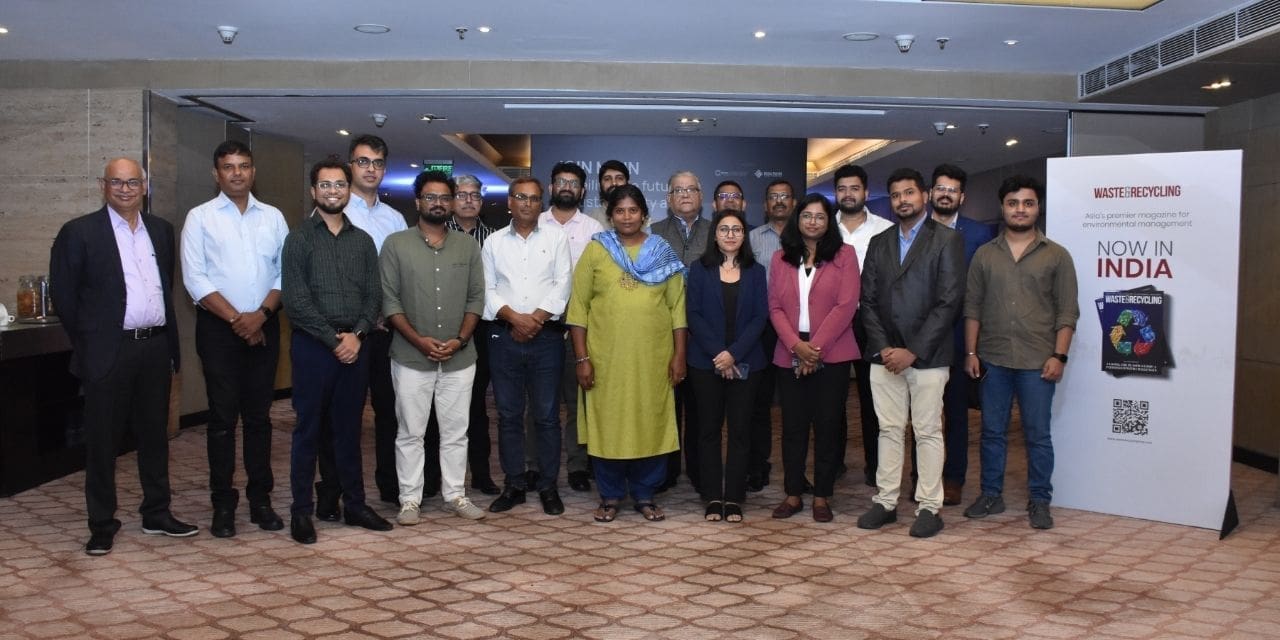New Delhi 16th July 2024: On July 5, at the JW Marriott Aerocity in New Delhi, a notable roundtable with the theme “Circular Economy for Plastics – Challenges and Opportunities in India” was held. This was a major step towards the next Plastics Recycling Show India 2024, which is slated to take place at NESCO in Mumbai from December 4th to 6th, 2024. This roundtable brought together distinguished business executives and dedicated specialists who, in spite of the many obstacles presented by India’s waste management ecosystem, work tirelessly to promote plastic recycling.
With the waste management market in India expected to increase at a compound annual growth rate (CAGR) of 6.50% from 2024 to 2032, from USD 13.1 billion in 2023 to USD 21.7 billion by 2032, the roundtable’s objectives were to address important concerns and investigate potential in this dynamic and quickly changing industry.
Keynote speakers at the event included Mr. Prashanth Singh, CEO and co-founder of Blue Planet; Mr. Kamran Ahmed, founder and director of Envofix; Mr. Rajesh Pahwa, founder and CEO of 21st Century Polymers; and Dr. Arun Kumar Sharma, founder of Ecube India 3R Waste. Mr. Shailendra Singh is the CEO and founder of SustainMantra. Prominent figures also offered insightful viewpoints on cutting-edge methods and environmentally friendly solutions in the sector. These included Mr. Punit Singhal, Director of JB Ecotex; Mr. Saurabh Goenka, Director of Pashupati Group; Mr. Paras Gupta, Director EPR & Sustainability Head of Gem Recycling; Mr. Aditya Pareek, Business Development Head at Race Eco Chain Ltd.
Mr. Vidya Bhooshan Singh, Plastic Waste Expert in the USAID-supported inREPLACE project at IPE Global; Mr. Manoj Gupta, Lead Sustainability at Plastics Experts; Mr. Vivek Tandon, Founder of revalyu; Mr. Vaibhav Rathi, Senior Technical Advisor at GIZ India; and Ms. Indumathi, Operator of Ward 150, Dry Waste Collection Centre (DWCC) in Bellandur, Bangalore, were among the other notable participants in the roundtable. Their knowledge brought to light the various strategies being used to successfully address the problems associated with plastic trash.
Moreover, the discussions were enriched by the presence of Mr. Akbar Allahbaksh, Director for Program Design at Hasiru Dala, and Ms. Deepanshi Gandherva, Senior Project Coordinator at the Indian Pollution Control Association (IPCA). Their grassroots-level experiences emphasized the importance of community-driven initiatives in achieving sustainable recycling practices.
Mr. Prashanth Singh, Co-Founder and CEO, Blue Planet, said “While we’ve made significant strides in plastic waste management, India’s enormous legacy waste problem remains a formidable challenge. At Blue Planet, we’ve successfully remediated over 25 plus projects across seven states, processing a substantial 1.5 million tons of waste, with the support of 62 cement plants. RDF, the most difficult and neglected waste stream, makes up 15-25% of the waste, posing a significant challenge in the waste management puzzle. However, we still face hurdles in accessing capital, decision-making, and policy standardization. To build a sustainable future
Ms. Indumathi, Operator, Ward 150, Dry Waste Collection Centre (DWCC), Bellandur, Bangalore, said “As a key stakeholder in the waste management ecosystem, I can attest that the current system faces significant challenges. The lack of economic value assigned to low-value plastics and Multi-Layered Plastics (MLPs) results in their disposal, perpetuating environmental harm. Our daily collections of 75-80 kilograms of single-use plastic, valued at INR 2,000-2,400, are testament to the scale of the issue. Furthermore, the 600 kilograms of MLPs generated daily pose a significant disposal challenge. With only 20-30% of waste being managed through dry waste collection centers, leaving 70-80% unaccounted for, our current approach requires transformation. We urgently need to integrate waste pickers into the Extended Producer Responsibility (EPR) framework, providing them with capacity building, training, and technological support.
Mr. Shailendra Singh, CEO and Founder of SustainMantra, highlighted, “The macro drivers for recycling are favorable, with evolving regulations and increased global attention on plastic waste. Consumers are becoming more aware of the environmental impact of plastic, creating momentum in the sector. India’s recycling sector, despite favourable market conditions, is still in its nascent stage. To fully leverage its potential, the industry requires a robust circular economy framework, a unified policy approach, and strategic investments in waste management infrastructure. With an estimated value of approximately INR 15,000 crores, waste must be recognized as a valuable resource.
Mr. Vaibhav Rathi, Senior Technical Advisor, GIZ India, said “Plastic management is the problem, not plastic itself. Rapid urbanization has led to a consumption surge, but lack of waste management capacity causes environmental harm. Local solutions, like hub-and-spoke recycling models, policy changes, and financial innovations, are crucial to tackle this issue. Cities must take ownership, leveraging local bylaws and knowledge of waste generation to establish recycling hubs and partner with nearby cities. While Extended Producer Responsibility (EPR) has a role, it’s not the only solution. Entrepreneurs must innovate to create a sustainable, economically viable waste management system.”

